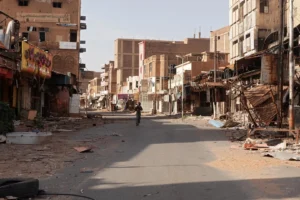Marking Israel’s national Holocaust Martyrs’ and Heroes’ Remembrance Day (Yom HaShoah), the annual International March of the Living took place on Tuesday, between Auschwitz 1 and Auschwitz-Birkenau in Poland. The annual event sees thousands of Jews and non-Jews from around the world, accompany Holocaust survivors and their descendants as they re-trace part of the route Jewish prisoners were forced to follow on the Death March at the end of the war.
Auschwitz is the largest and deadliest of six dedicated extermination camps built by the Nazis and used to carry out the Final Solution, to annihilate the Jews of Europe and beyond. In total, more than six million Jews were murdered by the Nazis during the Holocaust, among them more than one million children.
For the first time, this year’s March included a dedicated memorial to the Jews of Tunisia and North Africa who were also subjected to Nazi oppression. In what is one of the relatively unknown episodes of the Holocaust, under Nazi occupation, many North African Jews were forced into concentration and labor camps, and some were even being deported to the death camps in Europe.
Taib was accompanied by his wife Iris, whose grandmother Miriam Heiman and great aunt, Eva, both survived Auschwitz. Iris has honored her grandmother’s memory by having her prisoner number tattooed on her own arm, as a constant reminder of her grandmother’s bravery and courage.
Leading impact entrepreneur and philanthropist, Founder and President of the Mitrelli Group and Menomadin foundation, Haim Taib, lit one of three memorials torches at Auschwitz, telling the story of his family from Tunisia during World War II.
Before World War II, Jews had lived in Arab countries and across North Africa for centuries, and had formed strong communities in places such as Iraq, Syria, Egypt, Yemen, Tunisia, and Morocco. While these communities were not directly targeted by the Nazi regime in the same way as European Jews were, they faced discrimination and persecution from both local governments and populations. Furthermore, during WWII, the Nazis and Axis powers also established a network of concentration camps in North Africa.
There was a total of 17 camps across the region, including 3 in Morocco, 3 in Algeria, 7 in Tunisia, and 4 in Libya. Some prisoners were also taken to Vichy camps in West Africa. Prisoners, including Jews and communists, were subjected to starvation and forced labor, and many died of diseases or were tortured and murdered.
Source: africa











Add Comment